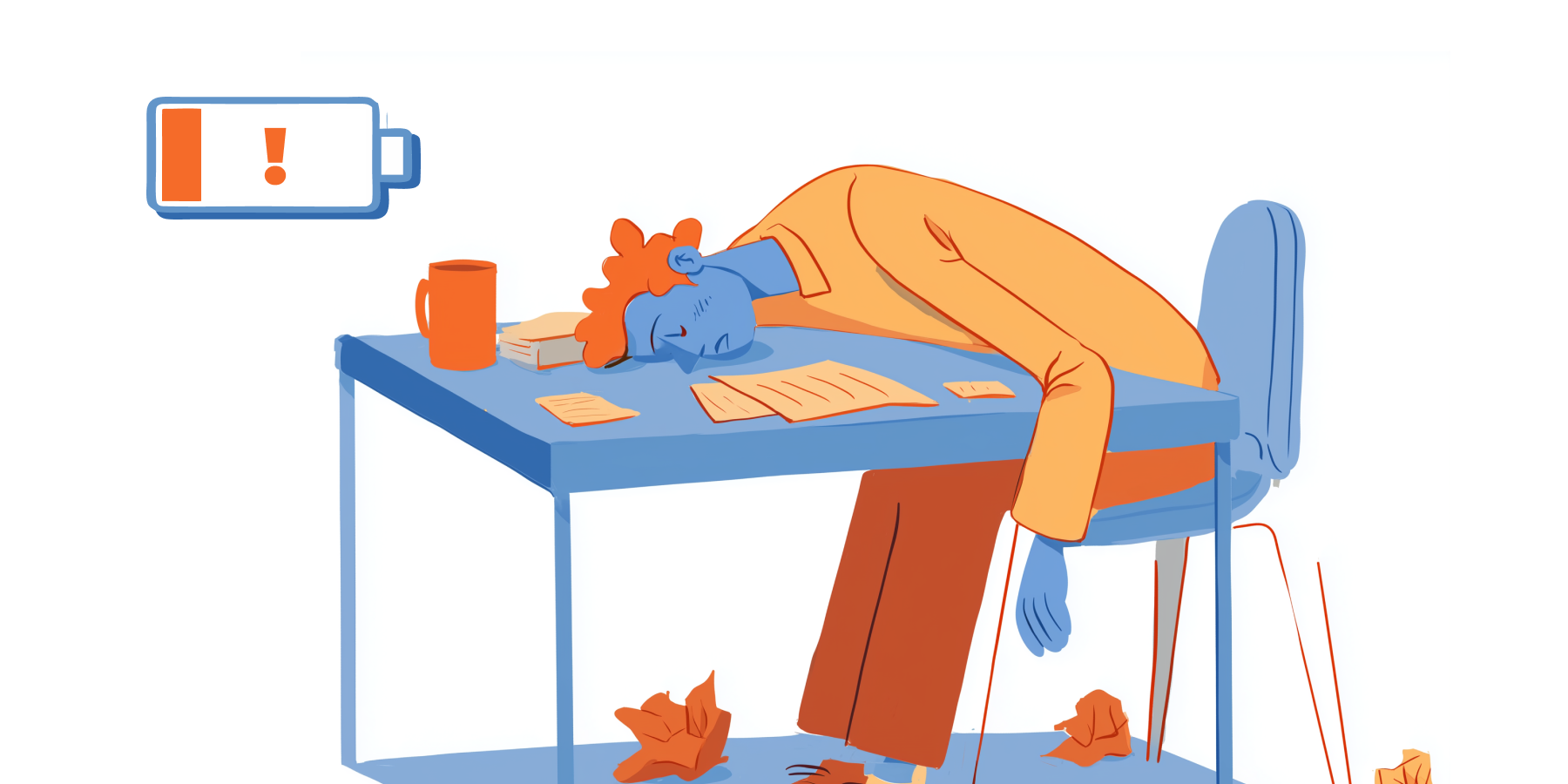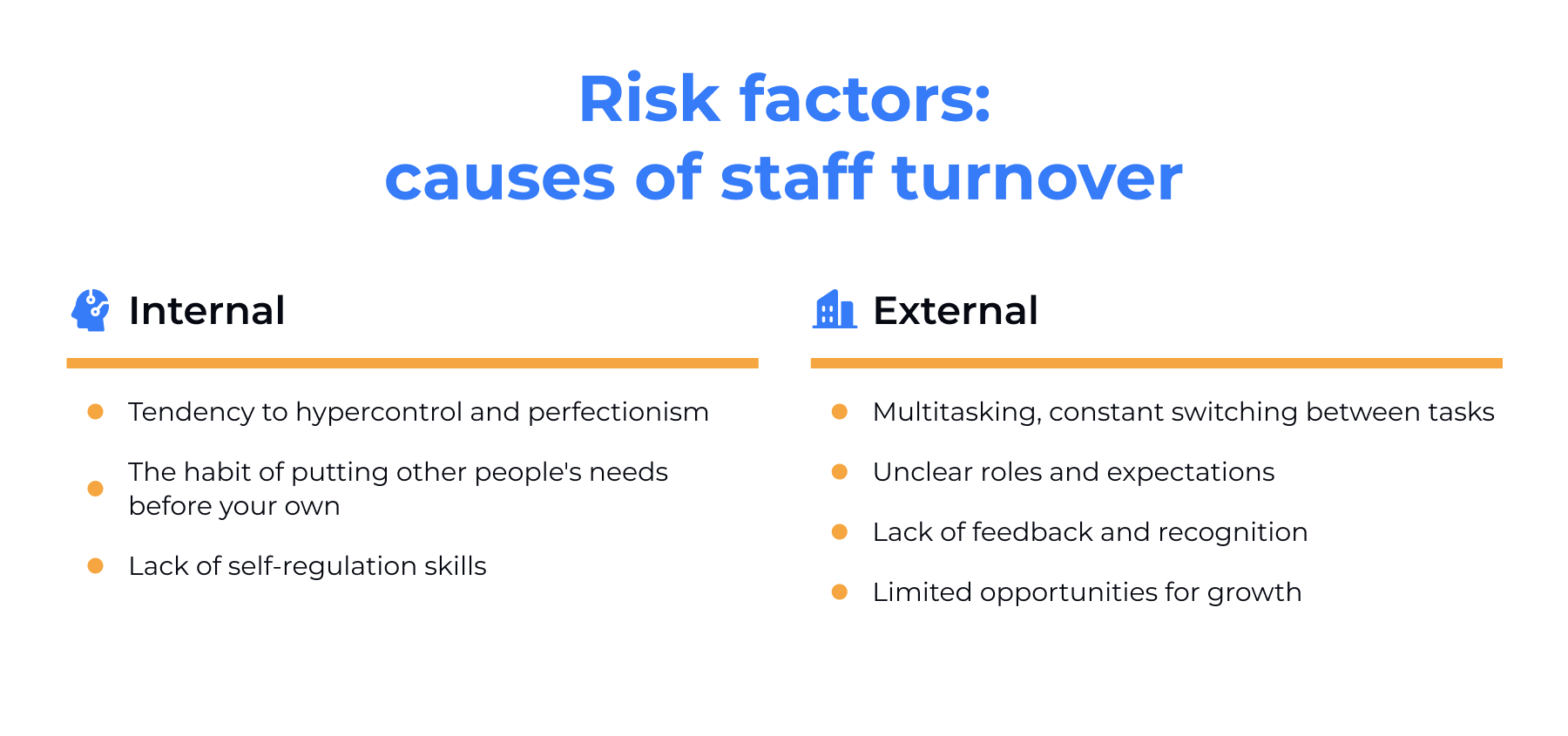
On a typical working day, our team had a very unusual discussion. An HR specialist and an analyst clashed over a seemingly simple topic: why do employees leave the company? Is it because of professional burnout at work? Or is it because of money?
Spoiler: we didn't find a single answer. But the conversation turned out to be so deep and honest that we decided to share its main points in this article.
More often employees leave not because they are underpaid, but because they are emotionally burned out. This condition is much more complex than just fatigue. It consists of:
meaninglessness in work;
task monotony;
tense or toxic atmosphere;
the feeling that work is not valued and not noticed.
Burnout develops gradually when personal and professional demands exceed our capacity for recovery. A person begins to feel «empty», loses interest in activities that used to bring joy.
If not taken care of, this condition can lead to serious physical illnesses and psychological disorders.
As a result, a person first «goes inside» — he or she stops being involved and begins to drift away from the team and tasks. The salary may grow, but the internal resource is already exhausted. Official firing is only a matter of time.
Professional burnout is a state of emotional and physical exhaustion caused by prolonged stress and lack of recovery. It is not limited only to professions with high emotional load. Today, professionals in a wide range of fields, including IT, marketing, education, health care and even management, face burnout.
The process begins unnoticed. Daily demands accumulate, the balance between giving and recovery is lost. The person begins to feel devastated, loses interest in work, his motivation and concentration decrease. Without timely help, this can lead to depression, psychosomatic disorders and long-term disability.

Here the positions of HR and the analyst matched: the reasons for leaving often depend on age, lifestyle and life circumstances.
Young professionals are more flexible and mobile. They have fewer financial and family commitments, take risks more easily and seek career challenges more often. Development, interest in projects and prospects are important to them.
Employees with experience, family and responsibilities tend to stay with a company longer. They weigh risks, assess stability. Even with signs of burnout, they are more likely to stay because they fear uncertainty, new stress, and re-adaptation. For them, not only the content of work is important, but also the feeling of security.
Self-care should be a priority, not a «thing for later». It is helpful to ask yourself simple but important questions on a regular basis:
1. What energizes me?
2. What tasks are exhausting?
3. How can I keep each type of energy in balance?
The team's analyst offered a different interpretation. In his opinion, the main reason for layoffs is the financial factor. Especially in the context of instability, inflation and growing needs. A salary increase, a better offer on the market — often become a trigger, especially for those who already feel dissatisfied.
He relies on data: in surveys, most employees point to salary as a key motivator for changing jobs. Indeed, for many, moving to a new company is a chance for higher income, especially if there is no room for growth within the current organization.
The truth, as is often the way, is not black and white. People don't leave just because of money or just because of burnout. They leave when the balance between internal costs and external bonuses is broken. When the minuses become too many and the pluses no longer compensate.
The causes depend on a variety of factors:
stages of life;
personal goals;
degree of inner exhaustion;
trust in management;
the culture within the team;
economic situation.
Every case is unique. And in each particular decision there is always a fusion of emotions, rational calculations and the context of life.
To realize that burnout is just around the corner, it's helpful to keep track of the four types of energy we function on.
|
Type of energy |
Exhaustion signals |
What helps in recovery |
|
Physical |
Permanent fatigue, weak immune system |
Sleeping schedule, physical activity, walks, balanced nutrition |
|
Emotional |
Irritability, apathy, detachment |
Restoring personal borders, a supportive environment, time for solitude and relaxation |
|
Intellectual |
Frustration, decreased productivity, difficulty making decisions |
New challenges, learning, creativity |
|
Spiritual |
Loss of meaning, inner desolation, cynicism |
Return to personal values, participation in meaningful projects, satisfying activities |
You can't solve the turnover problem by focusing on compensation alone. And you can't maintain loyalty by ignoring the state of your employees.
Understanding the cause of dismissal and turnover is not about choosing one side, but about taking a holistic view. Such discussions are important. They make you think not only about why people leave, but also why they stay. What really keeps employees in a company — and what undermines motivation from within.
In fact, it's about creating a culture where people want to stay — not out of fear, but by internal consent. Where contributions are valued, borders are respected, and recovery is supported, instead of being squeezed to the bone.
And you can start small — with a personal reboot. Restore your sleep, pay attention to how your energy is spent. Because burnout is cured not by changing jobs, but by returning to yourself.
Our team argument is not over. And probably never will be. The analyst has the numbers and the logic of the market. HR has observation experience and an understanding of human psychology. These two perspectives do not compete, but complement each other.
Start by restoring basic resources: normalize sleep, reduce unnecessary stress, return to a daily routine of activities that bring pleasure. Gradually restore borders, minimize toxic environment, rethink goals and priorities. Sometimes a temporary switch of tasks or work format (e.g., telecommuting, part-time work) can help.
In addition to salary and working conditions, turnover is often caused by lack of recognition, poor management, blurred roles, lack of development and an unfavorable team atmosphere. Employees also leave when there is a lack of trust in management or when company values diverge from personal values. These factors are not always immediately visible, but they are the ones that undermine motivation from within.